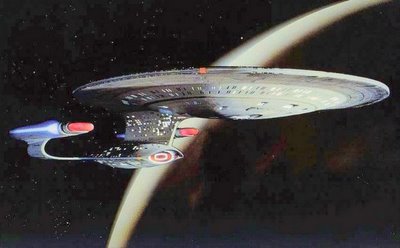
[[M I L E S T O N E S]] * Who would’ve thought, after the original Star Trek TV series was abruptly cancelled--just three years into its run--that the whole world would now be celebrating the 40th anniversary of its debut on September 8, 1966? But for those who discovered Gene Roddenberry’s final frontier either during the show’s initial broadcast, during repeats of that original series (which was my case), or as a result of the four series, 10 theatrical films, and one cartoon series that Star Trek spawned over the last four decades, the attraction was hard to miss.
Roddenberry originally conceived of his show as “a Wagon Train to the stars,” and there has always been a great deal of high adventure and the wide-eyed sense discovery to these series. However, Star Trek has evolved beyond a merely action-oriented and conflict-heavy concept, to embrace psychological issues, racial issues, and the xenophobia to be expected when so many different species come into contact with one another. Imparting too much philosophical importance to a TV series seems naïve; yet while Star Trek has been overwhelmingly a source of entertainment, it has also used the conventions and unconventionality of science fiction to tell stories that mirror the troubles and truths of the late 20th and early 21st century. The fact that space travelers 100, 300, and 400 years from now must deal with problems not so dissimilar from those facing people nowadays demonstrates the root fallibility of mankind, but also the expectation that what we think of now as insurmountable woes are, from the perspective of the far future, only matters to daunt but not defeat us. If there is any overriding message to Star Trek, it is that hopes survives.
And, it seems, so does the baby Roddenberry birthed on the small screen 40 years ago. As has been reported recently, an 11th Star Trek movie is on the drawing boards, to be produced by Lost co-creators J. J. Abrams and Damon Lindelof. Although I am concerned to see the franchise pass out of the hands of longtime steward Rick Berman, I can only be pleased that its longevity is ensured, at least in the short term. I grew up on Star Trek; I’d like to see future generations do the same.
May it live long and prosper, to quote a certain Vulcan.
Below: This version of the original Star Trek opening and closing features Alexander Courage’s famous theme music.
READ MORE: “My Second-Favorite Trek ...,” by Christopher Mills (Atomic Pulp).







1 comment:
I never could get past the fact that all those alien species were more than a little humanoid and tended to speak English. The Universe of Star Trek has a millionth of the biodiversity of the Amazon basin.
I realize the problem is as much with lack of money as a lack of imagination, but the net effect is the same. I always found it only a little more watchable than CAptian video (yes I'm showing my age)
Post a Comment